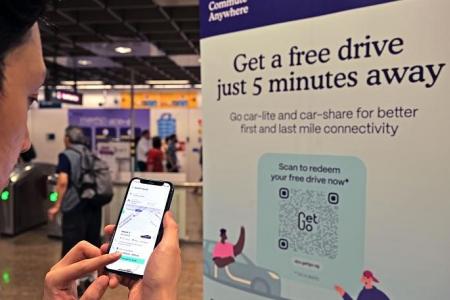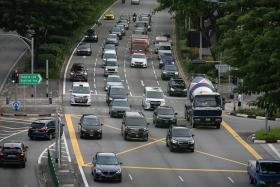400 shared cars near MRT stops in SBS Transit-GetGo tie-up
In a novel move, a public transport operator has tied up with a car-sharing firm to offer commuters better first- and last-mile connections, such as commutes from MRT stations to homes.
On Feb 26, SBS Transit (SBST), Singapore’s biggest public bus company that also operates the North East and Downtown MRT lines, signed a memorandum of understanding (MOU) with GetGo, a three-year-old car-sharing business with around 3,000 cars, to do just that.
Some 400 GetGo cars will from Feb 26 be parked within a five- to 10-minute walk, or about 500m, of 50 MRT stations along the two MRT lines, as well as bus interchanges that SBST runs. Users can locate and book the cars via the GetGo app.
GetGo chief executive Toh Ting Feng said the MOU marked “a pivotal step towards realising Singapore’s ‘car-lite’ vision”.
SBST chief executive Jeffrey Sim said the tie-up with GetGo will “make our buses and trains more accessible, inclusive and convenient for our commuters”.
Mr Sim said this followed the operator’s tie-up with bicycle-sharing firm Anywheel in 2023 to offer better first- and last-mile solutions to its passengers. “Transport is about connectivity, flexibility and choices,” he added, saying the cooperation with GetGo adds to “optionality”.
Mr Sim and Mr Toh said they were in talks to offer the combined public transport and car-sharing service to corporations with environmental, social and corporate governance targets.
“A few employees could share a car to complete their journey to work from an MRT station,” Mr Sim said, explaining that that would defray the cost of a GetGo time- and distance-based rental, which is $6 to $10 an hour.
Asked how that would work, since GetGo cars need to be parked in the same carpark where they were picked up to end a rental, Mr Toh said: “We don’t have all the answers yet. This is just a start.”
He added: “If you had to go from Jurong to Changi, the entire journey might be too costly by car.
“You could do it by train, but in Changi, you could take a GetGo car to do whatever you need to do there, and then return it before taking the train back to Jurong.”
Associate Professor Walter Theseira, who heads the Singapore University of Social Sciences’ urban transportation programme, said: “Car-sharing has long been proposed to address first- and last-mile issues. Usually, the context is to rely on public transit to do the long-distance connections, and for cars to do the first or last mile because of poor public transport connectivity at the train station. But most train stations in Singapore have good bus connectivity.
“Still, train stations are a good catchment area for car-sharing, as they are located in population centres. In that sense, it may also be about branding and co-marketing as much as actually adding new car-sharing sites.”
Author Jimmy Chua, 40, said: “It’s a good option for off-peak usage, for families to travel to local attractions such as the zoo, East Coast Park or the farms in the Lim Chu Kang area – places which are not easily accessible without a car.
“But it may be difficult to get a car during peak periods, such as weekends and public holidays.”
Indeed, Mr Toh said although its fleet has an average hired-out rate of 40 per cent to 50 per cent, the cars are almost fully occupied on weekends and public holidays.
Get The New Paper on your phone with the free TNP app. Download from the Apple App Store or Google Play Store now


